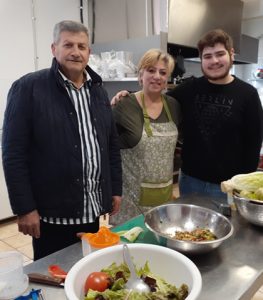Why migrant small businesses are vital to Australia’s COVID recovery
Australia’s migrant small businesses will be key to Australia’s recovery from the economic and social recovery from the ravages of the COVID-19 pandemic, a raft of new data shows.
Small businesses contributed almost $418 billion to Australia’s GDP in 2018-19, or 32 per cent of the total economy, according to the Australian Small Business and Family Enterprise Ombudsman (ASBFEO).
 And they employed about 41 per cent of the workforce, driving new jobs, connections and community cohesion.
And they employed about 41 per cent of the workforce, driving new jobs, connections and community cohesion.
As the nation moves beyond Covid-19, they will continue to play a significant role.
Underpinning Australia’s small business landscape are many migrant success stories.
According to the CGU Migrant Small Business Report, in 2017 more than a third of small businesses were run by first or second-generation migrants, most of whom didn’t own a business before coming to Australia.
Migrant business owners employed 1.4 million people across Australia and had an annual revenue that was 53 per cent higher than for non-migrant businesses.
The report found people migrated to Australia primarily for its quality of life (47 per cent) and to provide for their families (34 per cent), but Australia has benefited greatly from their arrival.
Many migrant small business owners are university educated, highly skilled and motivated by ideas and future growth.
The report found that more than half of Australia’s migrant community had a bachelor degree or higher, and 23 per cent of migrant business owners started their business because they desired to “try out an innovative idea”, compared to 16 per cent of non-migrant business owners.
The data shows migrant enterprises drive Australian employment with a third of migrant business owners planning on hiring new people to grow their business, and more providing training to young people than non-migrant owners (25 per cent versus 19 per cent).
A recent Migration Council of Australia report predicted that by 2050, migration will contribute $1.6 trillion to Australia’s GDP, and add 15.7 per cent to the nation’s workforce participation rate.
A recent Scanlon Foundation essay outlined some of these businesses and their impact on local communities.
“Offering everything from organic produce to traditional medicine, these business owners have become touchstones of their local communities,” the essay said.
It said migrant business owners’ social contributions shape modern Australia, through the food, music, language and tradition that give this country its reputation for multiculturalism and introduce non-migrants to new perspectives.
While a third of migrant business owners surveyed for the CGU report believed their cultural background had helped them succeed, not all Australians have recognised its value.
And although 14 per cent said their business had benefited from the unique skills and strong work ethic their cultural background had provided them, 12 per cent reported being affected by racism or discrimination.
Many migrant business people have pivoted and adapted their entrepreneurial models during the COVID lockdowns. And many say they will keep these new ways of working in place after the pandemic.
During last year’s long lockdown refugee-run businesses proved resilient and innovative in the face of the economic downturn caused by the COVID-19 pandemic.
An audit of small businesses last year found that more than 300 had been opened by refugees in Melbourne and Sydney over the previous two years.
Since trading restrictions were imposed in March effectively because of the COVID-19 lockdown, a follow up audit found just 11 per cent of these businesses had stopped trading or reduced their turnover by more than 70 per cent.
This compares with Australian Bureau of Statistics (ABS) figures which show that across the whole economy 43 per cent of businesses have had to sack workers or place them on unpaid leave.
Syrian refugees Attalah and Helda Abo, who run a Syrian restaurant in Melbourne, have pivoted to a takeaway business during then city’s five lockdowns.
“It got more difficult with the COVID restrictions but we changed the way we work and focused on takeaway. We’ve also taken the opportunity to renovate the restaurant,” Attalah said.
“It’s going well with takeaway and we have managed to keep employing our three staff. They are amazing people and they have become part of our family,” he said.
“The COVID changes have been hard but there are many people suffering more than us. We are grateful to be here in this country and we are grateful for the support of the local people here; and also of the Australian people and government,” Attalah said.
Cosmetics entrepreneur Fadi Abo says that selling online and targeting a global a market has meant his company ‘Clarcias’ has been able to keep trading through the pandemic.
“The COVID-19 pandemic has obviously been tragic but we’ve had a rush of orders because people are staying at home. We are making it easier for customers with free shipping and a 60-day money back guarantee,” Fadi said.
AMES Australia CEO Cath Scarth said there was strong evidence to show refugees were not only more likely to start a business than most Australians but also make a success of it.
“The ABS and the OECD have produced research that shows refugees are incredibly entrepreneurial and have a resilience that comes from surviving difficulty,” she said.
“We have supported a significant number of our refugee clients to start their own businesses to achieve economic participation and independence. In many cases they have started businesses when they have been unable to find permanent and durable employment,” Ms Scarth said.
Read more here:
https://www.asbfeo.gov.au/resources/small-business-counts
https://apo.org.au/node/128756
https://scanloninstitute.org.au/news/new-essay-migrant-small-business-australia
https://amesnews.com.au/lead-story/refugee-businesses-weathering-covid-19-downturn/












